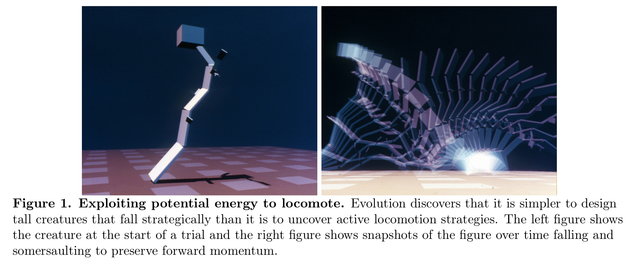Assorted links V
The surprising creativity of digital evolution

when you give a computer system a goal, and freedom in how it achieves that goal, then be prepared for surprises in the strategies it comes up with! Some surprises are pleasant (as in ‘oh that’s clever’), but some surprises show the system going outside the bounds of what you intended (but forgot to specify, because you never realised this could be a possibility…) using any means at its disposal to maximise the given objective.
The analogy to human systems is left to the imagination of the reader.
Empiricism is standpoint epistemology
Feminist standpoint theorists make three principal claims: (1) Knowledge is socially situated. (2) Marginalized groups are socially situated in ways that make it more possible for them to be aware of things and ask questions than it is for the non-marginalized. (3) Research, particularly that focused on power relations, should begin with the lives of the marginalized.
I have a definite soft spot for efforts to translate claims from one paradigm to another.
Statistically Controlling for Confounding Constructs Is Harder than You Think
Suppose we are given city statistics covering a four-month summer period, and observe that swimming pool deaths tend to increase on days when more ice cream is sold. As astute analysts, we immediately identify average daily temperature as a confound: on hotter days, people are more likely to both buy ice cream and visit swimming pools. Using multiple regression, we can statistically control for this confound, thereby eliminating the direct relationship between ice cream sales and swimming pool deaths.
Now consider the following twist. Rather than directly observing recorded daily temperatures, suppose we obtain self-reported Likert ratings of subjectively perceived heat levels. […] Fig 2 illustrates what happens when the error-laden subjective heat ratings are used in place of the more precisely recorded daily temperatures. […] When controlling for the subjective heat ratings (Fig 2B), the partial correlation between ice cream sales and swimming pool deaths is smaller, but remains positive and statistically significant, r(118) = .33, p < .001. Is the conclusion warranted that ice cream sales are a useful predictor of swimming pool deaths, over and above daily temperature? Obviously not. The problem is that subjective heat ratings are a noisy proxy for physical temperature, so controlling for the former does not equate observations on the latter.
The Psychology of Speciesism: How We Privilege Certain Animals Over Others
The post title oversells it a bit IMO, but still interesting preliminary findings:
[W]e developed a Speciesism Scale: a standardised, validated, and reliable measurement instrument that can assess the extent to which a person has speciesist views.
Speciesism correlates positively with racism, sexism, and homophobia, and seems to be underpinned by the same socio-ideological beliefs. Similar to racism and sexism, speciesism appears to be an expression of Social Dominance Orientation: the ideological belief that inequality can be justified and that weaker groups should be dominated by stronger groups […]. In addition, speciesism correlates negatively with both empathy and actively open-minded thinking. Men are more likely to be speciesists than women. Yet, there are no correlations with age or education.
-
Agnotology is the study of culturally induced ignorance or doubt. The tobacco industry is an easy example. “Doubt is our product”, says one industry memo.